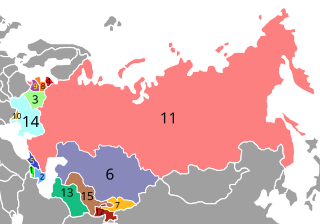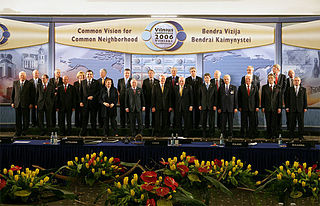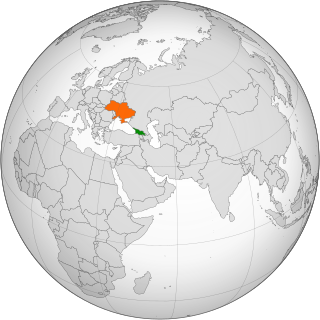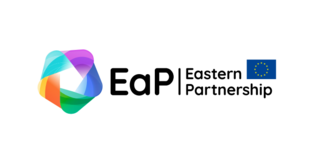
The Commonwealth of Independent States (CIS) is a regional intergovernmental organization in Eurasia. It was formed following the dissolution of the Soviet Union in 1991. It covers an area of 20,368,759 km2 (7,864,422 sq mi) and has an estimated population of 246,200,194. The CIS encourages cooperation in economic, political, and military affairs and has certain powers relating to the coordination of trade, finance, lawmaking, and security, including cross-border crime prevention.
Europe is often divided into regions and subregions based on geographical, cultural or historical factors. Since there is no universal agreement on Europe's regional composition, the placement of individual countries may vary based on criteria being used. For instance, the Balkans is a distinct geographical region within Europe, but individual countries may alternatively be grouped into South-eastern Europe or Southern Europe.

The GUAM Organization for Democracy and Economic Development is a regional organization of four post-Soviet states: Georgia, Ukraine, Azerbaijan, and Moldova.

Viktor Andriiovych Yushchenko is a Ukrainian politician who was the third president of Ukraine from 23 January 2005 to 25 February 2010. He aimed to orient Ukraine towards the West, European Union and NATO.

Presidential elections were held in Ukraine on 31 October, 21 November and 26 December 2004. This was the fourth presidential election in Ukraine following independence from the Soviet Union. The last stages of the election were contested between the opposition leader Viktor Yushchenko and incumbent Prime Minister Viktor Yanukovych from the Party of Regions. It was later determined by the Ukrainian Supreme Court that the election was plagued by widespread falsification of the results in favour of Yanukovych.

Yulia Volodymyrivna Tymoshenko is a Ukrainian politician, who served as Prime Minister of Ukraine in 2005, and again from 2007 until 2010; the first and only woman in Ukraine to hold that position. She has been a member of the Verkhovna Rada as People's Deputy of Ukraine several times between 1997 and 2007, and presently as of 2014, and was First Deputy Prime Minister of Ukraine for the fuel and energy complex from 1999 to 2001. She is a Candidate of Economic Sciences.

The post-Soviet states, also referred to as the former Soviet Union (FSU) or the former Soviet republics, are the independent sovereign states that emerged/re-emerged from the dissolution of the Soviet Union in 1991. Prior to their independence, they existed as Union Republics, which were the top-level constituents of the Soviet Union. There are 15 post-Soviet states in total: Armenia, Azerbaijan, Belarus, Estonia, Georgia, Kazakhstan, Kyrgyzstan, Latvia, Lithuania, Moldova, Russia, Tajikistan, Turkmenistan, Ukraine, and Uzbekistan. Each of these countries succeeded their respective Union Republics: the Armenian SSR, the Azerbaijan SSR, the Byelorussian SSR, the Estonian SSR, the Georgian SSR, the Kazakh SSR, the Kirghiz SSR, the Latvian SSR, the Lithuanian SSR, the Moldavian SSR, the Russian SFSR, the Tajik SSR, the Turkmen SSR, the Ukrainian SSR, and the Uzbek SSR. In Russia, the term "near abroad" is sometimes used to refer to the post-Soviet states other than Russia.
The Odesa–Brody pipeline is a crude oil pipeline between the Ukrainian cities Odesa at the Black Sea, and Brody near the Ukrainian-Polish border. There are plans to expand the pipeline to Płock, and furthermore to Gdańsk in Poland. The pipeline is operated by UkrTransNafta, Ukraine's state-owned oil pipeline company.

International relations between the European Union (EU) and Ukraine are shaped through the Ukraine–European Union Association Agreement and the Deep and Comprehensive Free Trade Area (DCFTA). Ukraine is a priority partner within the Eastern Partnership and the European Neighbourhood Policy (ENP). The EU and Ukraine developed an increasingly close relationship, going beyond co-operation, to gradual economic integration and deepening of political co-operation. On 23 June 2022, the European Council granted Ukraine the status of a candidate for accession to the European Union.

Vilnius Conference 2006: Common Vision for Common Neighborhood brought together delegations from the Baltic and Black Sea regions to discuss common interests and reinforce their commitments to the advancement of democracy and common values in their respective regions. The Conference took place in Vilnius, the capital of Lithuania, and was hosted by the President of Lithuania, Valdas Adamkus.

The inaugural session of the Black Sea Forum for Partnership and Dialogue (BSF) was held on June 4–6, 2006 in Bucharest. The Forum is a Romanian initiative, initially meant to hold annual presidential-level summits and thematic or sectoral-cooperation meeting during those annual intervals. The Forum is not meant to create new regional institutions, but rather to turn into a regular consultative process among countries of the extended Black Sea region and between this group of countries and international organizations such as the European Union. After the inaugural summit, no other summits were planned.
The Community of Democratic Choice Youth Forum is an international organization registered in Riga, Latvia. It aims to promote partnership and dialogue among youth from the region of the Community of Democratic Choice.

Since their independence from the Soviet Union, Georgia and Ukraine have forged close political and cultural relations. The diplomatic relations between the two nations are realized at the level of embassies and consulates. Due to the prosecution in Georgia of Georgian/Ukrainian politician Mikheil Saakashvili and the 2022 Russian invasion of Ukraine, relations between the two countries have soured significantly.

The Republic of Azerbaijan and the European Union (EU) have maintained a positive relationship through the years and have become more closely linked since 1991. Azerbaijan is currently part of the European Neighborhood Policy, the Eastern Partnership and the Council of Europe. The EU is the largest foreign grant donor to and investor in Azerbaijan, both in the government sector and civil society, making available over 600 million EURO of bilateral EU assistance since 1992.

Greece and Ukraine have deep ties due to Orthodox Christianity and enjoy strong diplomatic relations, due to Greece’s active diplomatic support for Ukraine over the Annexation of Crimea by the Russian Federation. Greece is also one of the main supporters of Ukraine’s entry into the European Union and NATO. Greece recognized Ukraine on December 31, 1991. Both countries established diplomatic relations in 1992. Greece opened an embassy in Kyiv in 1993, general-consulates were set up in Mariupol and Odesa. Ukraine has opened an embassy in Athens and since April 2004 a general-consulate in Thessaloniki. Both countries are full members of the Organization for Security and Co-operation in Europe and of the Organization of the Black Sea Economic Cooperation. There is a large Greek community living in Ukraine. Ukraine was first settled by the Greeks as early as 500 B.C. The Ukrainian city of Odesa was founded by ancient Greek colonists, being also the place where the Filiki Eteria secret organization was founded. Greece is a member of the European Union and NATO, which Ukraine applied for in 2022.

The Eastern Partnership (EaP) is a joint initiative of the European Union, together with its member states, and six Eastern European countries. The EaP framework governs the EU's relationship with the post-Soviet states of Armenia, Azerbaijan, Belarus, Georgia, Moldova, and Ukraine. The EaP is intended to provide a forum for discussions regarding trade, economic strategy, travel agreements, and other issues between the EU and its Eastern European neighbours. It also aims at building a common area of shared values of democracy, prosperity, stability, and increased cooperation. The project was initiated by Poland and a subsequent proposal was prepared in co-operation with Sweden. It was presented by the foreign ministers of Poland and Sweden at the EU's General Affairs and External Relations Council in Brussels on 26 May 2008. The Eastern Partnership was inaugurated by the EU in Prague, Czech Republic on 7 May 2009.
The 2008 Ukrainian political crisis started after President Viktor Yushchenko's Our Ukraine–People's Self-Defense Bloc (NU-NS) withdrew from the governing coalition following a vote on a bill to limit the President's powers in which the Prime Minister's Bloc Yulia Tymoshenko (BYuT) voted with the opposition Party of Regions. The bill would have required the consent of the Prime Minister for the appointment and dismissal of the Prosecutor General by the President, given the government power to appoint local heads of government if the President rejects the candidates, stripped from the President the right to reject a candidate for Prime Minister, dismiss the Defense, Interior and Foreign Ministers, and appoint a head of the State Intelligence Service. President Yushchenko stated that a clear position on the 2008 Russo-Georgian War was one of the conditions under which return to talks in the Parliament was possible, as well as the repeal of all the constitutional laws adopted after 3 September. Yushchenko claimed that a "de-facto coalition" was formed with 'no other aims but to conduct coup d'état and usurp power in the country'. Tymoshenko stated that the real intentions behind the President's party in 'declaring war on her' was to ensure his victory in the next presidential election, although she still called for a reformation of the coalition between the two parties. She also reiterated her position on the Georgian conflict, claiming to be neutral and more in line with the European Union.

Mikheil Janelidze is a chairman of Center for European Governance & Economy. He is a former Georgian government official who served as Vice Prime Minister (2017–2018), Minister of Foreign Affairs (2015–2018), First Deputy Minister of Foreign Affairs (2015) and Deputy Minister of Economy and Sustainable Development of Georgia (2011-2015).
GUAM was created to help participants to use mutual cooperation to become closer to European Union and NATO. GUAM countries were bound by a desire to prevent Russian expansionism in the region. Azerbaijan has a strategic role in the Organization for Democracy and Economic Development. Expanding the links with international organizations and individual countries is in the interest of Azerbaijan.

The Lublin Triangle is a regional alliance of three European countries – Lithuania, Poland, and Ukraine – for the purposes of strengthening mutual military, cultural, economic and political cooperation and supporting Ukraine's integration into the European Union and NATO. The Lublin Triangle initiative invokes the integrative heritage of the 1569 Union of Lublin.

















